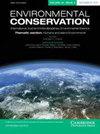The Ethiopian wolf can act as a flagship and umbrella species to protect the Afroalpine ecosystem and foster sustainable development
IF 2.6
3区 环境科学与生态学
Q2 BIODIVERSITY CONSERVATION
引用次数: 0
Abstract
Summary Habitat alteration and climate change are important threats to terrestrial biodiversity in the tropics. Endorsing flagship or umbrella species can help conserve sympatric biodiversity, restore degraded ecosystems and achieve United Nations Sustainable Development Goals (UN SDGs). The Ethiopian wolf ( Canis simensis ) is a rare and endemic Ethiopian canid. It is Africa’s most endangered canid species and is restricted to several isolated patches of Afroalpine habitats. While its behavioural ecology and conservation biology have been well studied, studies of the Ethiopian wolf’s significance for the conservation of its habitat and sympatric species are lacking. Here we use geographical range overlap and geospatial modelling to evaluate the importance of the Ethiopian wolf as a flagship and/or umbrella species. We assess whether conservation interventions targeting the Ethiopian wolf could help to restore and protect Afroalpine habitat and conserve sympatric species whilst simultaneously providing a wide range of socioeconomic and environmental benefits. We found that Ethiopian wolves share their range with 73 endemic and/or threatened vertebrate species, 68 of which are Afroalpine ecosystem species, and at least 121 endemic and/or threatened plant species. Ethiopian wolves are taxonomically distinctive and charismatic species classified as Endangered on the International Union for Conservation of Nature (IUCN) Red List. Thus, they meet both the flagship and umbrella species criteria to restore Afroalpine habitats and conserve threatened sympatric species. A conservation strategy protecting and restoring Afroalpine habitat has the potential to contribute to achieving at least five of the 17 UN SDGs. The protection of flagship and umbrella species should be integrated into broader regional biodiversity and habitat conservation.埃塞俄比亚狼可以作为保护非洲高山生态系统和促进可持续发展的旗舰和保护伞物种
生境改变和气候变化是热带陆地生物多样性面临的重要威胁。认可旗舰物种或保护伞物种有助于保护同域生物多样性,恢复退化的生态系统,实现联合国可持续发展目标。埃塞俄比亚狼(Canis simensis)是一种罕见的埃塞俄比亚特有犬科动物。它是非洲最濒危的犬科动物,只存在于非洲高山栖息地的几个孤立的斑块上。虽然对埃塞俄比亚狼的行为生态学和保护生物学进行了很好的研究,但对其栖息地和同域物种保护的重要性的研究还很缺乏。在这里,我们使用地理范围重叠和地理空间建模来评估埃塞俄比亚狼作为旗舰和/或伞形物种的重要性。我们评估了针对埃塞俄比亚狼的保护干预措施是否有助于恢复和保护非洲高山栖息地和保护同域物种,同时提供广泛的社会经济和环境效益。我们发现,埃塞俄比亚狼与73种特有和/或受威胁的脊椎动物(其中68种是非洲高山生态系统物种)和至少121种特有和/或受威胁的植物物种共享其活动范围。埃塞俄比亚狼是一种在分类学上独特而有魅力的物种,被国际自然保护联盟(IUCN)列为濒危物种红色名录。因此,它们既符合旗舰物种标准,也符合保护伞物种标准,以恢复非洲高山栖息地,保护受威胁的同域物种。保护和恢复非洲高山栖息地的保护战略有可能有助于实现17项联合国可持续发展目标中的至少5项。旗舰和伞形物种的保护应纳入更广泛的区域生物多样性和栖息地保护。
本文章由计算机程序翻译,如有差异,请以英文原文为准。
求助全文
约1分钟内获得全文
求助全文
来源期刊

Environmental Conservation
环境科学-环境科学
CiteScore
5.20
自引率
3.70%
发文量
43
审稿时长
>36 weeks
期刊介绍:
Environmental Conservation is one of the longest-standing, most highly-cited of the interdisciplinary environmental science journals. It includes research papers, reports, comments, subject reviews, and book reviews addressing environmental policy, practice, and natural and social science of environmental concern at the global level, informed by rigorous local level case studies. The journal"s scope is very broad, including issues in human institutions, ecosystem change, resource utilisation, terrestrial biomes, aquatic systems, and coastal and land use management. Environmental Conservation is essential reading for all environmentalists, managers, consultants, agency workers and scientists wishing to keep abreast of current developments in environmental science.
 求助内容:
求助内容: 应助结果提醒方式:
应助结果提醒方式:


